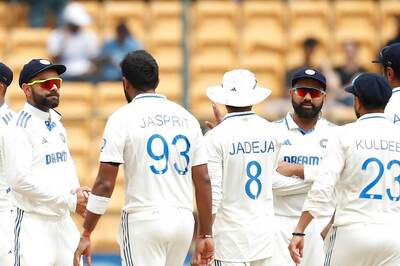
views
We are all aware of the immense research, pre-production preparations, hectic shooting schedules (sometimes under trying circumstances), on-site challenges, and extensive post-production work that goes into filmmaking. And we also know that when it's a period drama, the challenge is far greater. From the script, dialogues, accurate casting, and sets to the look of the characters, every big and small detail is a priority, especially at a time when period films aren't being welcomed with open arms.
And while the last leg of actress Kangana Ranaut's upcoming film Manikarnika - The Queen of Jhansi's is underway in Rajasthan, the one thing that is being carefully crafted to recreate the aura, royalty, braveness and fierceness of Rani of Jhansi in the most authentic way possible, is the costume designing spearheaded by designer Neeta Lulla.
The film is an epic biography based on the life of Rani Laxmibai of Jhansi.
Ever since the film's shooting began, Kangan's fan clubs have been sharing pictures on social media revealing her look in the film. And from what we have seen so far, the costumes seem to be one of the driving forces in creating that perfect bold, courageous, daring and fierce look of the valiant warrior queen.
Interestingly, Kangana as the Rani of Jhansi will be seen sporting India's heritage fabric Khadi, sourced by the designer from the government-run Khadi and Village Industries Commission.
To know more about costume designing, its role in the narrative, the idea behind including khadi in the costume line, Kangana's look in the upcoming film and more, we spoke to distinguished designer Neeta Lulla to get an insight into the epic film that will hit the silver screen soon.
In an exclusive interview to News18.com, Lulla explained what prompted her to include khadi in her costume line. While revealing that the heritage fabric met all her requirements -- sustainability, silhouette, strong design detail and a sophisticated aesthetic, she said, "The way the fabric drapes is what draws me to it. It is comfortable and yet luxurious, and makes the wearer feel at ease even in the most elaborate ensembles."
Elaborating on the idea to use khadi as one of the main fabrics that Kangana will be seen donning in the film, Lulla told News18.com, "I feel Khadi embodies a lot of character. I feel everyone (not just designers but actors too) in the public sphere have a social responsibility to promote the fabric of freedom, not only because it involves history and heritage but because Khadi has the potential to employ the largest number of people in rural areas. Wearing khadi means paying homage to craftsperson who spin the yarn on the charkha. Even in the machine-age, they work round-the-clock to produce the hand-spun fabric."
When asked if including the heritage fabric in a costume line for a mainstream Hindi film will redefine the way people look at khadi and give the fabric a new lease of life, Lulla said, "I think khadi needs to be popularized to a great extent and mainstream cinema will be able to do full justice in promoting the fabric to the millennial generation and the masses alike."
While speaking about the importance of costume in a narrative, Lulla explained the purposes costumes serve in a film. She said, "Costumes, like the characters they embody, must evolve within the context of the story and the arc of the character within it. Film costuming serves two purposes: the first is to support the narrative by creating authentic characters and the second is composition, to provide balance within the frame by using color, texture, and silhouette. If the dialogue is the melody of a movie, the color provides the harmony, a satisfying visual cohesiveness," said Lulla in an exclusive chat with News18.com.
On being asked about what prompted her to take up costume designing for the period drama, the designer said, "I have always been very intrigued by period dramas that dive into history, culture and lineage. There’s one thing being a fashion designer and there’s another whole new high associated with being a costume designer. It’s always challenging to experiment and not get typecast into a certain style which costume designing for period dramas allows you to do. It was incredible to explore the nuanced, heightened costume language of this genre."
While expressing that she personally loves the way Kangana breathes life into every outfit that she sports, the designer said, "I personally love Kangana Ranaut and think she is one woman who can bring to the fore, the character to every outfit."
In Manikarnika: The Queen of Jhansi, while Kangana will be seen donning a lot of khadi, the diva will also be seen sporting a rich and royal colour pallette, flaunting fabrics like raw cotton and woven textures like brocade and paithani, most of it sourced from Varanasi, Jaipur and Maharashtra, embroidered by various local artisans.
Lulla revealed that it took her team close to 8 months of intensive research before the commencement of shooting for Manikarnika.
Speaking about the extensive research and labor that goes into creating costumes for a period drama, Lulla said, "All epic magnum-opuses require a lot of research of the era, characterisation, using the right fabrics to create the look and creating a style which the contemporary audiences identify with. My team undertook close to 8 months of intensive research before the commencement of shooting for Manikarnika."
"It all begins with reading and dissecting the script. I like to know the backstories of every character, where they are coming from, why they behave the way they do. I have multiple discussions with the filmmaker in general about the feel of the film, what the film is trying to convey, what each character stands for. The second stage is of research, reference, deciding on the palette, making sketches and mood boards. Once the look has been developed its about getting the samples, doing look tests, making lookbooks and finally the suppliers, tailors and assistants come in for measurements. The last stage is building a comfort level with the star cast," she said.
Lastly, talking about the challenges she faced as a designer, spearheading the costume line for Manikarnika: The Queen of Jhansi, Lulla said, "A designer’s work exists to actualize the screenplay, defining the people and the places, a marriage of concept and imagery. That’s why costume designers are called the language of film design. Every person from the actors to the director to the set designer to the technician need to not just be on the same page with respect to the vision, but also bring a sense of synergy through their concepts to make the entire filmmaking process collaborative and creative. This poses as a challenge when you’re working with a huge team on a film. The battle scenes were probably the most challenging due to the sheer scale. It is the centerpiece of the film and I had to live up to expectation."



















Comments
0 comment